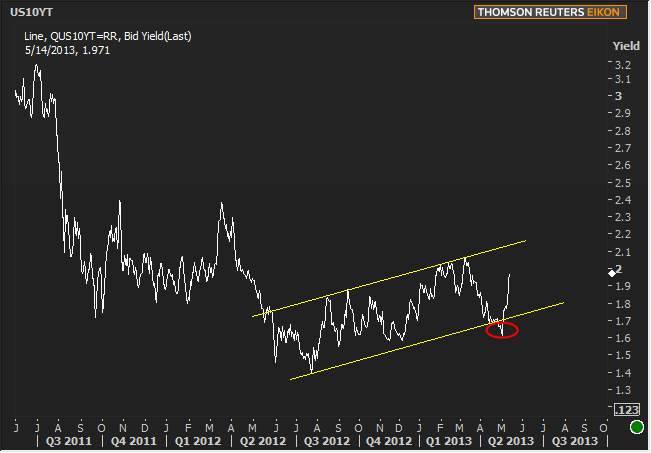Mortgage rates began the day in promising shape, but lost their composure early and often. Despite several lenders releasing their initial rate sheets today in line with yesterday's, the afternoon brought 1-3 rounds of new rate sheets with costs significantly increased from morning offerings. The best-execution rate for conventional, 30yr fixed loans has already moved most of the way through 3.625% and some lenders are edging into 3.75% territory.
Today's losses weren't a factor of any economic reports in the US (or abroad, for that matter), yet markets moved with determination. All of the more granular contributors are operating in the shadow of the FOMC issues we discussed yesterday. Today was additionally frustrating as the granular factors were particularly hard to find, having lots to do with European debt announcements, ratings, and other esoteric trading considerations that don't make for easy explanations on the evening news.
One way to think about the current weakness that isn't very esoteric at all, is in terms of the following chart. This is 10yr yields, and thus isn't necessarily as indicative of mortgage rates over time, but does a better job of accounting for over momentum in the world of longer term interest rates. The steeper the white line, the more meaningful the movement.

The yellow lines are the "trend" leading generally higher in rates since mid 2012 that we've been discussing since January/February. Rates attempted to break that trend heading into May, but resoundingly failed with the Employment Situation Report came in stronger-than-expected on May 3rd. Viewed in this way, no overcomplication is necessary in accounting for the seemingly relentless drive higher in rates. Keep in mind, that although the yellow lines extend into the future, this isn't a prediction. There are many other lines that could be overlaid on the chart to make cases for other points, and this merely represents one of the possibilities.
Many market participants are expecting that white line to stall out at the same levels it did last time. If it doesn't, mortgage rates would suffer greatly, probably. Unfortunately, thinking about what might happen in that case, begins an endless loop of "ifs/thens" becuase many believe that if rates were to rise that abruptly, the shock to the housing market would be sufficient for the Fed to "do something" to bring mortgage rates back down. There are so many eventualities that the safest thing to plan for in the future is uncertainty when it comes to rates. We're still in territory that's historically quite low, but beyond that, there's no guarantee we won't continue to move higher.
Loan Originator Perspectives
“We're proceeding with extreme caution ahead of next Wednesday's FOMC minutes, because the last two FOMC minutes revealed a growing bias toward winding down QE rate stimulus, and this trend looks likely to continue. Locking refinances and newly ratified purchases. ” -Julian Hebron, Branch Manager, RPM Mortgage
"Loan officers, lock desks, and borrowers scrambled for cover today as rates worsened dramatically after a strong open. All in all, we're down 14/32 in pricing from the highs of the day, translating to higher closing costs and/or rates for virtually all lenders and loans. While we're still in our prior trading range, moving as quickly as we did is disconcerting at a minimum. Don't be surprised if rate quotes from last week (or this AM!) are no longer available." -Ted Rood, Senior Originator, Wintrust Mortgage
"Locking would be safe and justified. Rates dipped in April, but that was just a head fake and we're back to grinding higher. Floating = asking for pain. Don't do it." -Mike Owens, Partner, Horizon Financial Inc.
Today's Best-Execution Rates
- 30YR FIXED - 3.625%, (3.75% not far from sharing the best-execution space)
- FHA/VA - 3.25% (varies more between lenders than conventional 30yr Fixed)
- 15 YEAR FIXED - 2.75-2.875%
- 5 YEAR ARMS - 2.625-3.25% depending on the lender
Ongoing Lock/Float Considerations
- After rising consistently from all-time lows in September and October 2012, rates challenged the long term trend higher, but failed to sustain a breakout
- EU and domestic economic data remain relevant to mortgage rates, but uncertainty over the Fed's bond-buying plans through the rest of the year is causing volatility
- The further we've progressed into 2013, the faster the swings have become
- (As always, please keep in mind that our talk of Best-Execution always pertains to a completely ideal scenario. There can be all sorts of reasons that your quoted rate would not be the same as our average rates, and in those cases, assuming you're following along on a day to day basis, simply use the Best-Ex levels we quote as a baseline to track potential movement in your quoted rate).




